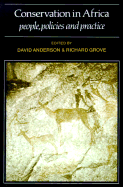Book contents
- Frontmatter
- Contents
- Preface
- List of contributors
- Introduction: The scramble for Eden: past, present and future in African conservation
- Part One Conservation ideologies in Africa
- Part Two Wildlife, Parks and Pastoralist
- Part Three Conservation priorities and rural communities
- Part Four Consequences for conservation and development
- Introduction
- 13 The political reality of conservation in Nigeria
- 14 Settlement, pastoralism and the commons: the ideology and practice of irrigation development in Northern Kenya
- 15 Approaches to water resource development, Sokoto Valley, Nigeria: the problem of sustainability
- 16 State policy and famine in the Awash Valley of Ethiopia: the lessons for conservation
- Index
14 - Settlement, pastoralism and the commons: the ideology and practice of irrigation development in Northern Kenya
Published online by Cambridge University Press: 04 April 2011
- Frontmatter
- Contents
- Preface
- List of contributors
- Introduction: The scramble for Eden: past, present and future in African conservation
- Part One Conservation ideologies in Africa
- Part Two Wildlife, Parks and Pastoralist
- Part Three Conservation priorities and rural communities
- Part Four Consequences for conservation and development
- Introduction
- 13 The political reality of conservation in Nigeria
- 14 Settlement, pastoralism and the commons: the ideology and practice of irrigation development in Northern Kenya
- 15 Approaches to water resource development, Sokoto Valley, Nigeria: the problem of sustainability
- 16 State policy and famine in the Awash Valley of Ethiopia: the lessons for conservation
- Index
Summary
Introduction
The most conspicuous changes in northern Kenya in recent years have been in the organisation of pastoralism. Pastoralism is becoming an increasingly part-time occupation. The wealthy, who also have access to the best jobs, tend to benefit the most from the changes, while the poor, who only have access to the worst jobs or no jobs at all, are thrust into ever increasing dependency (Dahl, 1979; Hogg, 1985a).The main reason for the changes has been the increasing intensity of national incorporation, which has increased the range of economic opportunities open to pastoralists and has led to the growth of permanent settlements. Yet government and donor agencies largely ignore these changes and continue to design their interventions in terms of an ideal model of pastoralism which, if it ever existed at all, has long since disappeared. In this paper I examine the reasons for the implementation and failure of one particularly important intervention, namely the development of irrigation agricultural schemes. I shall argue that official endeavours to conserve the range and to alleviate poverty have actually resulted in increasing the vulnerability of the people of the area to drought and its consequences of famine and pauperisation. Research on irrigation development was carried out in Isiolo, Turkana and Garissa Districts between 1982 and 1984 as part of a British Overseas Development Administration funded investigation of pastoralist responses to permanent settlement (Hogg, 1985c).
- Type
- Chapter
- Information
- Conservation in AfricaPeoples, Policies and Practice, pp. 293 - 306Publisher: Cambridge University PressPrint publication year: 1988
- 2
- Cited by



